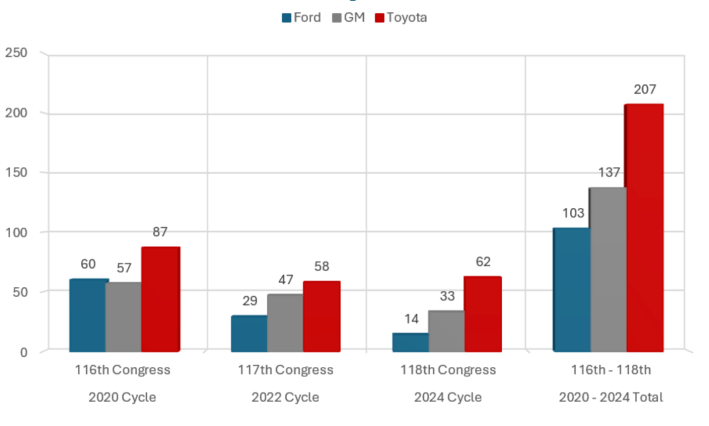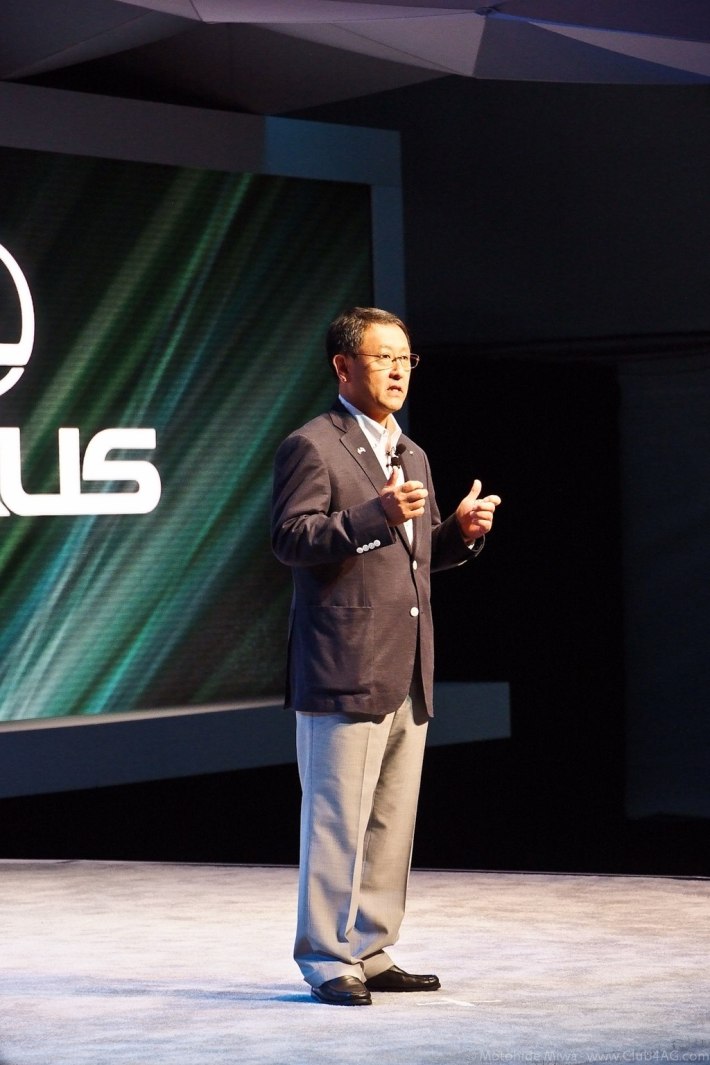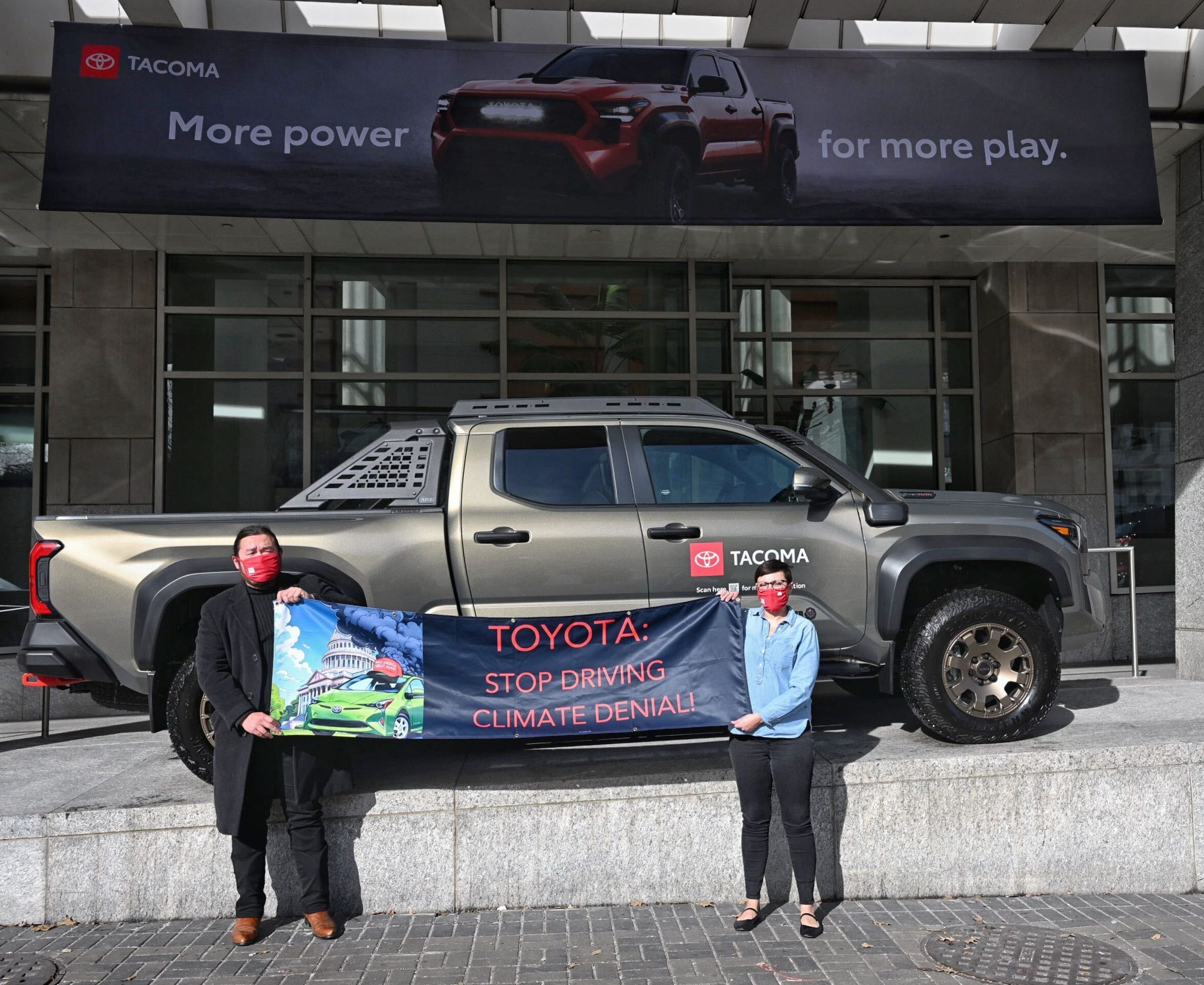The largest automaker in the world is also making the largest contributions to politicians who deny climate change, a new report finds — and while those donations target electric vehicles, they're taking other green transportation solutions down right along with them.
Last week, protestors from Public Citizen interrupted the D.C. Auto Show demanding that Toyota "stop toying with the climate" by funding the campaigns of congressional candidates who spread disinformation about global warming, 207 of whom have received money from the automaker's political action committee over the last three election cycles. (Those figures do not include politicians who have not publicly denied humanity's role in a dangerously warming planet, but have committed to reversing climate action, like car dealer-turned-Ohio-Sen. Bernie Moreno, to whom the Toyota PAC has donated more than $11,000.)
The demonstrators were quickly ushered off stage by security — after a snide comment from a moderator that "clearly they weren't loved as children" — but have continued spreading their message online through a report that details exactly how and why the Japanese auto giant has worked to seed the legislative branch with politicians who vote against critical environmental protections, even as they pledge to "reach carbon neutrality with our products."
Report author Adam Zuckerman acknowledged that Toyota isn't the only automaker that has fought to elect carbon-increasing politicians, and that political action committees attached to Ford and General Motors do it, too. In recent years, though, Toyota has pulled ahead of both those PACs, donating to more than four times as many climate deniers as Ford and nearly twice as many as GM — and doing so in dollar amounts more than double the latter and nine times the former.
All that spending, meanwhile, has been complemented by a public relations blitz, including a recent op-ed in the Wall Street Journal calling on Trump to ditch the (nonexistent) Biden-era EV "mandate." That stance represents a significant break with the largest auto industry lobbying group, which has called to maintain EV tax credits and public support for charging infrastructure.
"Really, since the re-election of the Trump administration and Republican trifecta, they've come out with guns blazing," added Zuckerman. "They've brought up their advocacy to another level."
Ostensibly, that advocacy is squarely focused on suppressing the popularity of electric vehicles, which Toyota has seen as a threat to its hybrid-centric business model since it first became a "green darling" with the introduction of the Prius in 1997. As EVs have gradually won market share and government support, though, then-president Akio Toyoda and other leaders at the company decided that rather than adapting to beat out its EV competitors, Toyota would ramp up its political lobbying efforts instead, distorting the market and keep Americans chained to the gas pump.
"[Toyota] gets a lot of credit for the Prius; it was the first popular mass-marketed hybrid vehicle in the United States, and they did a really good job marketing it and getting people in Hollywood to drive them," added Zuckerman. "But I compare gas powered hybrids to natural gas — that it is, better than coal, but insufficient to deal with the climate crisis, especially as we're seeing wildfires in Los Angeles. I think that Toyota really carved out a niche with hybrids, but they've been unwilling to move beyond that in the last 30 years."

As Toyota's crusade against EVs has heated up, it's propelled opponents of shared and active transportation into office, too.
For instance, Toyota's PAC has donated $24,000 to date to James Comer (R-Ky), who either voted "no" or missed the vote on 100 percent of bills related to sustainable modes that have crossed his desk to date, according to the League of Conversation Voters; so did David Schweikert (R-Ariz.) who has received $23,500 so far, and Speaker of the House Mike Johnson (R-La.), who received the maximum allowable $10,000 in 2024.
In the meantime, Toyota has publicly advertised its commitment to going "Beyond Zero," and advertises itself as offering "more low- and zero-emission vehicles combined than any other automaker" — despite the fact that it actually sells fewer EVs than Chinese smartphone manufacturer Xiaomi, which pivoted to automobiles less than a year ago.
"It feels like a lot of Toyota's climate efforts are about marketing, and not much else," added Zuckerman. "Over the last decade,Toyota spent more than $17 billion in marketing. If they invested that in actually making electric vehicles, they'd be in a much different place than they are now. They'd be a leader instead of a laggard."
Of course, even if Toyota did an about-face on EVs tomorrow, America still wouldn't be able to decarbonize its dirty transportation sector — at least not without reducing U.S. residents' total driving, too. Still, Zuckerman stresses that as long as there are cars on the road, Toyota's fight against electrifying them will have major climate complications, as well as on the non-automotive modes it's dragging down with them.

"I'm definitely an advocate for public transit; I don't have a car myself," added Zuckerman. "But Toyota is the largest automaker in the world ... and if Toyota makes a shift, if they stop dragging their feet, it could have a huge impact on sort of the automotive world as a whole, as well as on the grid."
Moreover, Zuckerman says it's important to name and shame the specific companies and corporate leaders who are funding climate-destroying policy, rather than treating automobility as a diffuse structure for which no one can be truly held accountable — and which no one has the power to change.
"It's important to demystify corporate power and realize that they're just people in these buildings making decisions, and that they can be influenced in the same way that anyone else can," added Zuckerman. "They have emotions, they have interests, they want to keep their jobs. They don't want to be seen publicly as doing something underhanded — and it's important to play to that, and to reveal who's behind these corporations."






